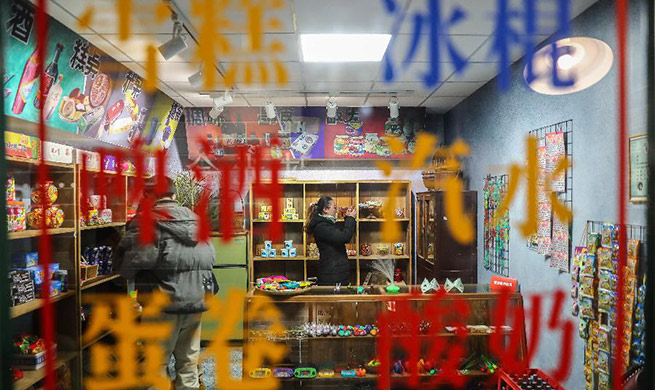FUZHOU, Nov. 24 (Xinhua) -- "I eat here often, but the sanitary conditions and customer service could be better," said Guan Shanqing, 24, who is not completely satisfied with Shaxian Delicacies.
Once a well-liked choice for many, the snack brand found in many Chinese cities, is currently facing an embarrassing situation.
Originating from Shaxian County in east China's Fujian Province, Shaxian Delicacies became a hit in the past decades. Countless people have to come to know and remember the name of this small town by grabbing a bite of its peanut butter noodles or pork wontons.
In the 1980s, local people started to open snack bars across the country. Along with the increasing number of college students, migrant workers and merchants in urban areas in the early stage of China's reform and opening-up, snacks from Shaxian County were warmly welcomed for their widely accepted flavors and affordable prices.
According to the local government, there are currently about 60,000 people from Shaxian County running snack bars across the country, with an annual income of 6 billion yuan (866 million U.S. dollars).
The industry has driven the town's development. "Noodles and wontons built the high-rise buildings of Shaxian," said local official Yang Xingzhong.
However, underneath the remarkable success of the industry, challenges have emerged in recent years.
According to a display board in a snack-themed museum in Shaxian County, the number of snack bars run by those from the county is more than 30,000. But Yang said only 2,000 of them were authorized to use the brand "Shaxian Delicacies," which was registered in 2016.
"The traditional husband and wife snack bar no longer fits with the customers' needs," Yang said, problems including poor sanitary conditions and disordered brand management are putting a brake on the industry's development.
The Shaxian County local government wants the brand to be repositioned.
Apart from registering a unified brand for local snacks, the government also set up supply chains to distribute semi-finished products to snack bars, hoping that standardized management can improve the brand's image.
Luo Fenlin, 27, has been running a Shaxian Delicacies bar in Beijing for four years. His eatery was franchised last year.
"A unified brand and improved decoration brought me more customers," Luo said. "It's necessary for the brand to establish certain standards. Only by doing so can the brand become more attractive."
"But I don't want the brand to change too much," said Guan. "I hope the prices will still be affordable."

















